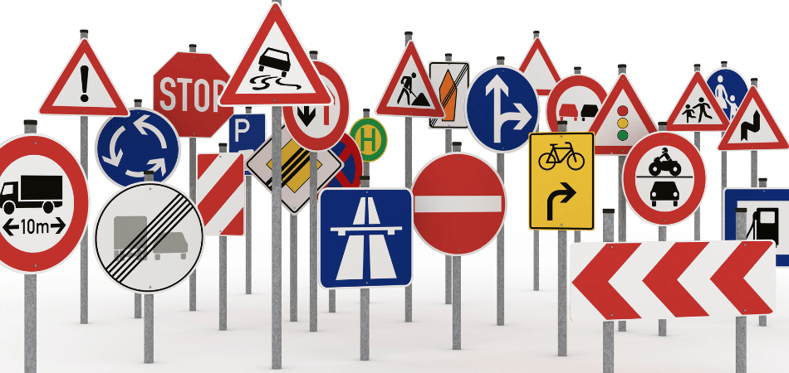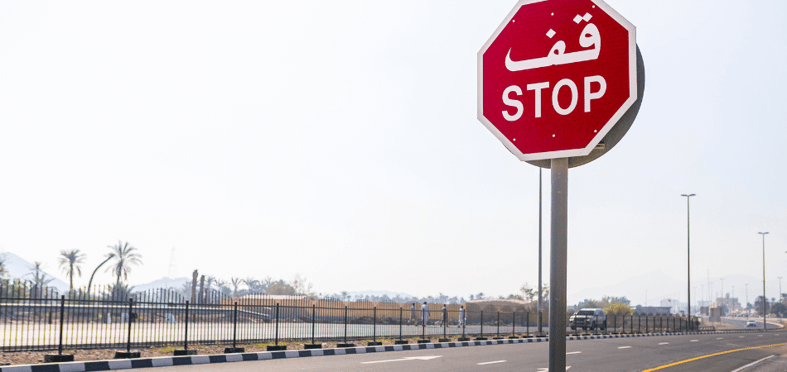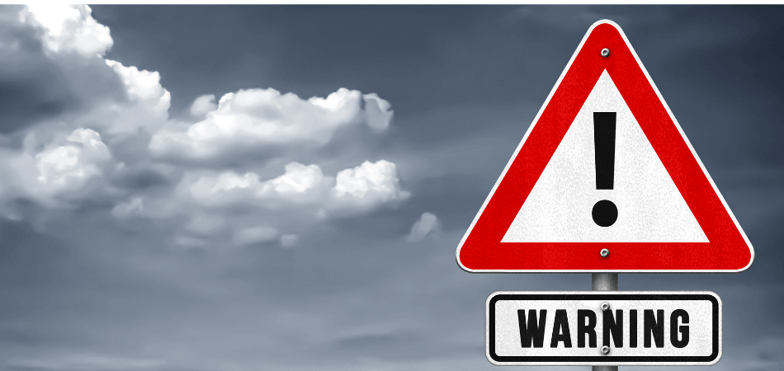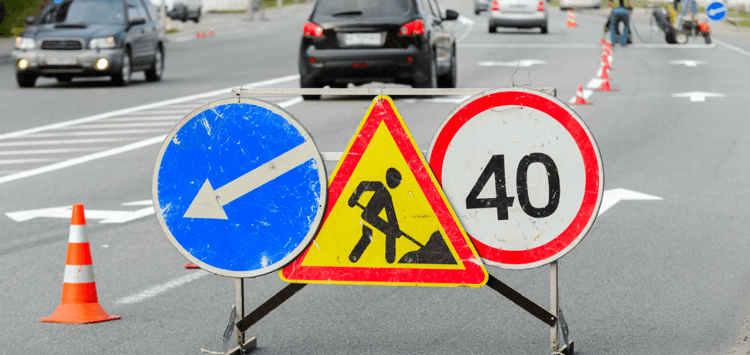Table of Content
- Understanding Traffic Signs and Symbols
- Regulatory Signs in the UAE
- Warning Signs in the UAE
- Informational Signs and Symbols
- Road Markings in the UAE
- Unique Traffic Signs and Symbols in the UAE
- Importance of Compliance and Safety
- FAQ's
- Conclusion
Traffic signs and symbols play a crucial role in maintaining road safety worldwide. In the United Arab Emirates (UAE), where diverse cultures and traffic dynamics intersect, an efficient traffic sign system is paramount.
This guide aims to delve into the intricacies of UAE traffic signs, serving as a comprehensive resource for both residents and visitors.
Understanding the significance of traffic symbols in the UAE ensures smoother navigation and adherence to regulations. For instance, if you're driving in Sharjah and want to ensure compliance, you should know how to check the Sharjah traffic fine by plate number. This helps drivers stay updated, avoid unexpected penalties, and maintain a clean driving record.
Understanding traffic road signs and adhering to driving regulations in the United Arab Emirates (UAE) is crucial for ensuring road safety and compliance with the law. As of November 2024, several updates have been introduced to enhance traffic management and safety across the country.
Key Updates in UAE Traffic Regulations:
-
Federal Decree-Law No. 14 of 2024: Implemented to modernize traffic regulations, this law includes amendments to vehicle classifications and integrates modern technologies into road systems to keep pace with global transportation developments.
-
Lowering of Minimum Driving Age: The legal driving age has been reduced from 18 to 17 years, allowing younger individuals to obtain a driving license under specific conditions.
-
Stricter Penalties for Traffic Violations: Enhanced penalties have been introduced for offenses such as hit-and-run incidents, with fines up to AED 100,000 and imprisonment for up to two years in cases causing injuries.
From informative signboards to intuitive symbols, the UAE's traffic sign system is tailored to enhance safety and streamline traffic flow. Let's explore the essential elements of traffic signboards and symbols in the UAE.
Understanding Traffic Signs and Symbols

Knowing traffic signs and symbols in the UAE is super important for staying safe on roads, especially in the UAE where there are specific rules and signs. These signs help drivers and walkers a lot, making traffic smoother and reducing accidents. They give different messages through their shapes, colors, and symbols.
The traffic signs in the UAE follow world standards, but they might have special features for local needs. Like, red means no-go, blue tells you what to do, and green gives guidance or info. Also, the shapes of signs often tell you what they mean; like triangles warn of dangers, circles mean you must do something.
On UAE signs, you'll see symbols for speed limits, where people cross, and directions to important places. Knowing what these symbols mean is crucial for everyone on the road to understand and follow the rules.
Everyone, drivers, and walkers alike, must follow traffic signs and symbols to keep the roads safe. If you ignore or don't understand signs, it can lead to accidents, jams, and legal trouble. So, knowing about UAE traffic signs and symbols is vital for being a responsible and safe road user.
Regulatory Signs in the UAE

Driving in Dubai United Arab Emirates (UAE) involves more than just being a good driver. It's important to understand the traffic signs that ensure safety for all.
These signs are strategically positioned along highways and streets to maintain order and facilitate smooth traffic flow.
Let's take a look at the different types of signs you'll see on UAE roads and why they're important for safe driving and keeping traffic moving well.
These signs are crucial for ensuring safety and smooth traffic flow.
Categories of Traffic Signs in the UAE:
-
Mandatory Signs: These instruct drivers on required actions, such as specific speed limits or directions. Examples include "Turn Right Only" and "Speed Limit" signs.
-
Control Signs: These indicate regulations like "Stop," "Give Way," and "No Entry," dictating the flow of traffic and right of way.
-
Warning Signs: These alert drivers to potential hazards ahead, such as curves, pedestrian crossings, or roadworks. Examples include "Curve Ahead" and "Road Narrows."
-
Prohibitory Signs: These indicate prohibited actions, such as "No U-Turn" or "No Parking," to prevent unsafe driving behaviors.
-
Informational Signs: These provide guidance on routes, destinations, and facilities, aiding in navigation. Examples include "Hospital Ahead" and "Fuel Station."
- Speed Limit Signs They show the maximum speed allowed, like 60 km/h in cities and 100-120 km/h on highways.
- No-Entry Signs: These indicate areas where cars aren't allowed, often at the start of one-way streets.
- Parking Regulation Signs: They specify where you can and can't park, like "no parking" or "handicapped only."
- Directional Signs: Guides directing you to different places like cities or landmarks.
- Pedestrian Crossing Signs: Alerts drivers to pedestrian crossings ahead, reminding them to slow down and yield.
Lane Usage Signs
- Indicate which lanes are for buses, bikes, turning, or overtaking.
- Traffic Signal Signs
- Inform drivers about upcoming traffic signals, including red lights and pedestrian crossings.
School Zone Signs
- Found near schools, they remind drivers to be cautious, especially when kids are present.
- Following these signs is essential for safety and smooth traffic flow, acting as a road rule book. Always pay attention and follow them!
Warning Signs in the UAE

Spotting and explaining warning signs meant to alert drivers about potential dangers or changes in road conditions:
-
Curves Ahead: This sign tells you there are bends or turns coming up. It often includes a recommended speed to help you navigate safely.
-
Pedestrian Crossing Alert: This sign advises drivers to be cautious of pedestrians crossing the road. It prompts them to reduce speed and proceed with care.
-
Animal Crossing Warning: This sign notifies drivers to be vigilant for animals crossing the road. It reminds them to avoid hitting animals.
-
Upcoming Traffic Lights: This sign indicates there are traffic lights or intersections ahead. It advises drivers to get ready for traffic changes.
-
Construction Zone: This sign lets drivers know there's road work happening. It warns about possible delays and road condition changes.
-
Slippery When Wet: This sign alerts drivers about slippery or dangerous roads. It could be from rain, oil spills, or loose gravel. It advises drivers to slow down and be cautious.
-
Narrow Road Ahead: This sign shows that the road is narrow. It reminds drivers to watch for oncoming traffic and keep a safe distance.
-
Steep Incline or Decline: This sign tells drivers about significant changes in road gradient. It warns against potential loss of control and advises drivers to choose the appropriate gear. Examples of common warning signs in the UAE, like curves, pedestrian crossings, and animal crossings:
-
Curves Ahead: You'll see this sign on roads with lots of bends. It helps drivers know to expect changes in direction and adjust their speed.
-
Pedestrian Crossings: These signs are near places like schools and residential areas. They remind drivers to watch out for people crossing the road.
-
Animal Crossings: These signs are often found in rural areas. They remind drivers to be cautious of animals crossing the road, especially at dawn and dusk.
-
Traffic Signals Ahead: Look for these signs before intersections with traffic lights. They help drivers anticipate stops and starts.
-
Road Work Ahead: These signs warn drivers about construction zones. They give drivers a heads-up to be careful and possibly find an alternative route.
-
Slippery Road: These signs are in areas with reduced traction. They tell drivers to slow down and be careful, especially on bridges or shaded sections.
-
Narrow Road: These signs indicate roads with limited width. They remind drivers to yield to oncoming traffic and maintain a safe speed.
-
Steep Incline or Decline: These signs warn drivers about steep hills. They remind drivers to control their speed and be cautious. Why it's important to follow warning signs to prevent accidents and ensure road safety:
-
Preventing Accidents: Following warning signs reduces the risk of crashes, injuries, and deaths by warning about potential hazards or changes in road conditions.
-
Increased Awareness: Following warning signs helps drivers stay aware of their surroundings. It allows them to anticipate and react to hazards on the road.
-
Promoting Road Safety: Respecting warning signs contributes to overall road safety. It encourages responsible driving and consideration for other road users.
-
Legal Compliance: Following warning signs isn't just about safety—it's the law. Disregarding traffic regulations and signs can result in penalties.
-
Reduced Traffic Jams: Following warning signs help prevent accidents, keeping traffic flowing smoothly and reducing congestion on the roads.
Informational Signs and Symbols in the UAE

They help drivers. They show directions. They give important information. In UAE, these signs are crucial. Many roads are there. Many tourists come.
Types of Signs in UAE
- Direction Signs: They show where to go. They show cities, airports, and landmarks. They have arrows and distances. In UAE, these signs are important for cities like Dubai and Abu Dhabi.
- Facility Signs: They show services. They show gas stations, hospitals, and parks. In UAE, these signs help drivers find services.
- Landmark Signs: They show special places. They show the Burj Khalifa, the Grand Mosque. In UAE, they help tourists.
- Symbol Signs: They use pictures. They help everyone understand. In UAE, they use symbols for fuel, hospitals, and rest areas.
Important Considerations for Drivers:
-
Right of Way: At intersections without traffic signals, vehicles approaching from the left must yield to those from the right.
-
Pedestrian Crossings: Drivers must yield to pedestrians at designated crossings and be vigilant in areas with high foot traffic.
-
Use of Mobile Phones: Operating a mobile phone while driving is strictly prohibited unless using a hands-free system.
-
Seat Belts: All occupants, including rear-seat passengers, are required to wear seat belts at all times.
-
Speed Limits: Adhering to posted speed limits is mandatory, with speed cameras widely used to enforce compliance.
Symbols Importance in the UAE: They show messages fast
- Pictograms: They are simple pictures. They show gas stations, hospitals, and restaurants.
- Color Codes: They use colors. Blue is for services. Green is for directions. Brown is for tourist spots.
- Text and Symbols Together: They use words and pictures. For example, a Hospital with a bed. Everyone can understand.
Road Markings in the UAE
Road markings are super important for controlling traffic and keeping everyone safe on roads in the United Arab Emirates (UAE).
They give clear visual clues to drivers, walkers, and others on the road, helping to show lanes, who has the right of way, and where dangers might be. Here's a look at some common road markings used in the UAE:
Lane Markings
-
Solid white lines: These lines show where one lane ends and another begins for traffic moving in the same direction. Usually, you shouldn't cross these solid white lines, unless it's necessary, like when you're merging or turning.
-
Dashed white lines: These lines mean you can change lanes if it's safe. When the lines are dashed, drivers can move from one lane to another.
-
Arrows: These painted arrows on the road show which way traffic should flow in each lane. They help drivers figure out, intersections and tricky road layouts.
Pedestrian Crossings
-
Zebra crossings: These crossings have black and white stripes and are for people to walk across safely. Drivers need to let people cross at these spots.
-
Pedestrian crossing signs: Besides the markings on the road, signs usually show where pedestrians can cross, reminding drivers to watch out for people walking.
Stop Lines
-
Solid white lines with "STOP": At intersections, these lines show where cars have to stop completely. Drivers must stop at these lines, even if it seems clear, and give way to others.
Why Road Markings Matter
-
Safety: Clear road markings lower the chances of accidents by showing everyone where to go.
-
Traffic Control: Road markings help guide traffic, manage lanes, and control intersections. This makes traffic smoother and less jammed up.
-
Following Rules: By showing rules clearly, road markings encourage drivers to follow the laws, making roads safer and more organized.
In the UAE, people have to follow these markings, or they could get fined. So, it's super important for everyone using the roads to understand and follow these signs to make sure traveling in the UAE stays safe and smooth.
Unique Traffic Signs and Symbols in the UAE
In the United Arab Emirates (UAE), traffic signs follow global standards from the Vienna Convention on Road Signs and Signals. This ensures safety and consistency on the roads.
However, there are unique aspects to the UAE's traffic signage system.
-
Islamic Cultural Symbols: Some UAE traffic signs may include symbols from Islamic culture to honor the country's heritage. For instance, signs for mosques might have dome or minaret icons.
-
Arabic Script: Unlike international standards, UAE signs may use Arabic script alongside English. This helps locals understand better. Due to the desert terrain, signs in the UAE might caution about sand dunes, crossings for camels, or other hazards related to the desert.
-
Heat-related Signs: Due to high temperatures, signs may warn about heat dangers like dehydration or heat exhaustion, especially for long-distance drivers.
-
Excessive Speed Warnings: With many highways, signs caution against speeding, especially in cities where it's risky.
-
Multilingual Signs: Because of the diverse population, some signs include languages like Hindi, Urdu, or Tagalog.
Electronic Variable Message Signs (VMS) provide live updates regarding road conditions, accidents, or traffic congestion, enhancing safety and efficiency while driving.
While the UAE follows global standards, these adaptations show consideration for the country's unique needs. They aim to improve safety and communication for everyone driving in the UAE.
Importance of Compliance and Safety
Understanding and following traffic signs and symbols is super important for keeping UAE roads safe and organized.
These signs are like messages that tell drivers and walkers what's up. Let's dive into why sticking to them matters:
-
Avoiding Crashes: Traffic signs and symbols are there to control traffic, warn about dangers, and guide everyone on the road. By listening to these signs, drivers can see potential problems ahead and do the right thing to avoid crashes.
-
Keeping Things in Order: Following traffic rules helps keep roads calm, stops traffic jams, and keeps things moving smoothly. When drivers follow signs, it makes the roads easier to predict, cutting down on crashes and gridlock.
-
Staying Legal: Ignoring signs can lead to trouble with the law, like fines or losing your license.
For Drivers
-
Know Your Signs: Learn what different signs and symbols mean. The UAE traffic folks have guides to help drivers understand what's what.
-
Stay Awake: Pay attention to signs while driving. Staying alert lets you react fast to changes on the road.
-
Watch Your Speed: Speed limit signs show how fast you should go in certain areas. Stick to these limits to stay safe and avoid accidents.
-
Be Polite: Let other drivers and walkers go first when signs say so. Being nice on the road keeps things safe and friendly.
For Walkers
-
Cross Where You're Supposed To: Use crosswalks and footbridges when crossing. Follow the signals to cross safely.
Before crossing, remember to look both ways for oncoming cars from both directions. Even if you have the right of way, always ensure that drivers acknowledge your presence.
To increase visibility, wear bright clothing or reflective gear, especially during nighttime. Utilize well-lit crosswalks to ensure drivers can easily spot you.
Stay focused and avoid distractions such as using your phone or listening to music while walking near roads. Keep your attention on the road to prevent accidents.
In summary, adhering to traffic signs and symbols is crucial for preventing accidents, maintaining order, and ensuring everyone's safety on UAE roads.
By understanding and obeying the rules, both drivers and pedestrians contribute to making transportation safer and more efficient for all.
FAQ's
Q1: What is the importance of understanding traffic signs and symbols in the UAE?
A. Learning about traffic signs and symbols in the UAE is really important. It helps keep everyone safe on the roads, makes traffic flow smoothly, and ensures everyone follows the rules. These signs give important information to drivers and people walking, so they can drive safely and avoid accidents.
Q2: Are UAE traffic signs standardized according to international conventions?
A. Yes, traffic signs in the UAE follow international standards set by agreements like the Vienna Convention on Road Signs and Signals. However, there might be changes made to suit local requirements, like adding Islamic cultural symbols or using signs in multiple languages.
Q3: What are some unique aspects of traffic signs in the UAE?
A. Unique aspects include the use of Arabic script alongside English, symbols reflecting Islamic culture, warnings about desert-related hazards, multilingual signage due to the diverse population, and electronic Variable Message Signs providing real-time updates.
Q4: Why is compliance with traffic signs and symbols important?
A. Following traffic signs and symbols is really important in the UAE. It helps prevent accidents, keeps the roads organized, avoids getting in trouble with the law, and makes sure everyone stays safe and the traffic flows smoothly.Q5: How can pedestrians contribute to road safety in the UAE?
A. People walking can help make roads safer by using crosswalks and footbridges that are meant for them, following signals, making sure they can be seen, not getting distracted, and paying attention when walking close to roads.
Conclusion
In summary, grasping the importance of traffic signs and symbols is crucial for advancing road safety in the UAE.
By getting to know the traffic sign system in the UAE and following its rules, both drivers and pedestrians are essential in making the roads safer and smoother.
It's more than just obeying rules; it's about building a culture where everyone cares about each other on the road. Let's collaborate to make sure everyone has safer journeys in the UAE.







